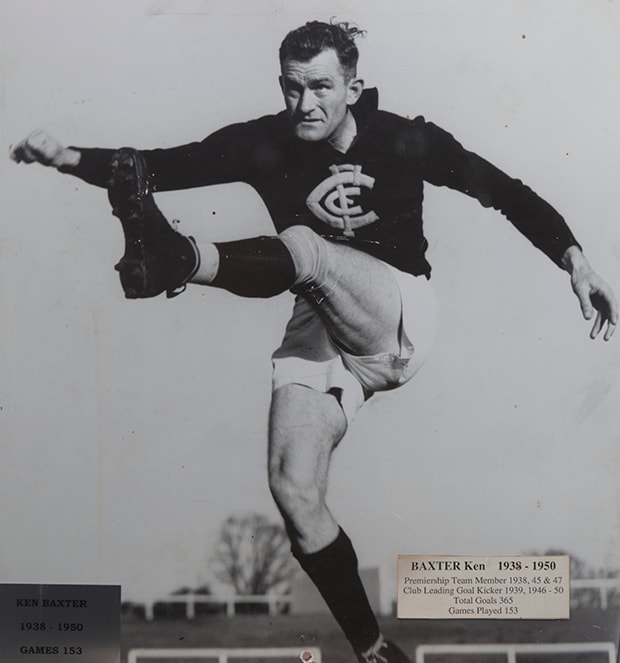A Tasmanian football history researcher has queried why 15 past players, amongst them Carlton premiership players Fred ‘Mulga’ Davies, Ken Baxter and Bob Green, haven’t been elevated to the AFL’s 200 Club under the League’s special circumstance rule.
Launceston resident Ross Smith has raised the issue with both the Commission and its historical department. This follows the AFL’s 2007 elevations of Geelong’s former wingman Wayne Closter (191 senior matches) and Premiership centre half-back Joe Sellwood (181), and Essendon’s three-time Premiership half-forward Jack Jones (175) “as the trio had suffered significant interruptions to their career due to war/active service”.
But Smith argues that in the interests of consistency, a minimum 15 players – Baxter, Davies and Green included - should all be elevated to the 200 Club in accordance with the 2007 ruling.
“The claim was made that they (Closter, Sellwood and Jones) were nominated due to special circumstances - career interrupted or delayed by war service,” Smith said.
“I don’t believe anyone should be in that special Club if the 200-game qualifying criteria has not been met, no matter what sad or unfortunate circumstance caused them to fall short of the figure.
“(But) there are at least 15 other players including a couple from Carlton who have been treated differently to the trio.”
One of them, the 1947 Premiership player Davies, represented the old dark Navy Blues in 125 matches in 1941 and 1946-’52, having missed almost five seasons of football due to wartime service.
“Fred Davies played one game for Carlton in 1941, then served his country later that year and also in 1942, ’43, ’44 and ’45, before returning to Carlton ranks in ’46. In all, his VFL/rep career was 125 games club plus one state game for a total of 126,” Smith said.
“He (Davies) missed almost 90 Carlton games whilst serving in the armed forces, so would have played 215.
“I imagine you like I would find it very difficult to accept a 126-game member of the ‘200 Club’, but if others are retained even though they also have less than 200, why shouldn't Davies and the 14 others be there as well?
“Surely the AFL has to be consistent and retain the integrity of the selection process.”
Baxter, Carlton’s only player of his generation to represent the Blues in their 1938, ’45 and ’47 Grand Final victories, turned out for his club in 153 matches in total.

Triple premiership player Ken Baxter. (Photo: Carlton Football Club)
But wartime service cost Baxter appearances in all Carlton matches of the 1942, ’43 and ’44 seasons, together with the first 10 matches of ’45 – a total of 58 matches missed.
Baxter, Davies and Green all died young.
Green was only 38 when he was hit and killed by a car as he tried to board a tram on Plenty Road in Preston in 1949.

Former Carlton player Bob Green was tragically killed at the age of 38. (Photo: Carlton Football Club)
Davies died after a short illness just one day short of his 40th birthday in Longford, Tasmania in 1961.
And Baxter was only 41 when he collapsed outside the Melbourne Magistrate’s Court and died of a brain aneurism in 1959.
But Baxter’s daughter Dianne perhaps spoke for all three men.
“I believe the AFL should commit to including those players who would have reached or surpassed the 200-game mark if they had not been away at war fighting to keep Australia safe,” Dianne said.
“All sons and daughters are proud of their fathers, simply for who they are or were - but such recognition by the AFL for their contributions not only to their country but also to their clubs and their fans would truly be a wonderful and fulfilling initiative.
“On a personal level, I believe my father is deserving of every accolade.”
The AFL has advised that its decision to induct Closter, Sellwood and Jones into the 200 Club ten years ago was based on the view that “the trio had suffered significant interruptions to their career due to war/active service”.
The 15 identified League footballers whose careers were interrupted by either wartime or national service are as follows;
WORLD WAR ONE
Wally Johnson (Fitzroy)
190 matches + 5 VFL rep matches (est. 32 matches lost)
Hugh James (Richmond)
188 matches + 8 VFL rep. matches (est. 51 matches lost)
Vic Cumberland (Melbourne, St Kilda)
176 matches + 3 VFL rep. matches (est. 30 matches lost)
Cliff Rankin (Geelong)
153 matches + 13 VFL rep. matches (est. 39 matches lost)
Alec Eason (Geelong, Richmond)
162 matches + 2 VFL rep. matches (est. 40 matches lost)
Arthur Hiskins (South Melbourne)
185 matches (est. 43 matches lost)
WORLD WAR TWO
Marcus Whelan (Collingwood)
173 matches + 3 VFL rep. matches (est. 55 matches lost)
Bob Green (Carlton)
187 matches + 1 VFL rep. match (est. 20 matches lost)
Fred Flanagan (Geelong)
163 matches + 22 VFL rep. matches (est. 38 matches lost)
Gordon Hocking (Collingwood)
171 matches + 9 VFL rep. matches (est. 62 matches lost)
Les Foote (North Melbourne, St Kilda)
167 matches + 10 VFL rep. matches (est. 33 matches lost)
Wally Lock (Melbourne)
140 matches (est. 68 matches lost)
Ken Baxter (Carlton)
153 matches (est. 58 matches lost)
Col Austen (Hawthorn, Richmond)
136 matches + 2 VFL rep. matches (est. 66 matches lost)
Fred Davies (Carlton)
125 matches + 1 VFL rep. match (est. 89 matches lost)
Jack Jones (Essendon)*
175 matches (est. 57 matches lost)
Joe Sellwood (Geelong)*
180 matches + 1 VFL rep. match (est. 30 matches lost)
VIETNAM WAR/NATIONAL SERVICE
Wayne Closter (Geelong)*
191 matches + 2 night matches (est. 12 matches lost)
* elevated to 200 Club



